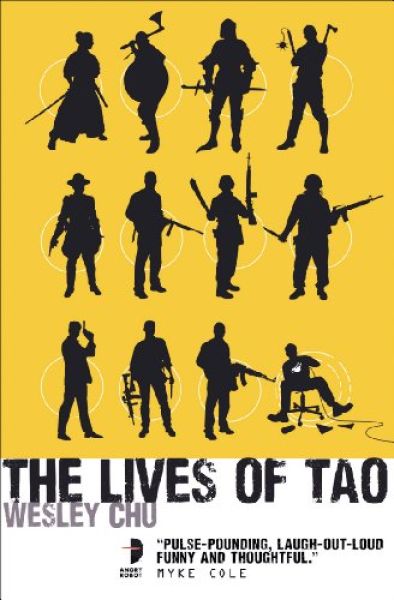The cat lives
The Lives of Tao (Tao, volume 1)
By Wesley Chu

15 Jul, 2015
0 comments
Wesley Chu’s 2013 debut novel The Lives of Tao appears to be warmly regarded, if one can judge by its 3.77 stars on Goodreads and 4 stars on Amazon. Once again I find myself out of step with the majority of readers. Welcome to yet another installment in “Nobody Cares Why You Hate Shakespeare, Leo,” with me playing the starring role of Leo Tolstoy.
Betrayed by a fellow agent, Edward Blair does what he can to salvage the situation by leaping from the top of an office building to certain death below. This is rather hard on Blair, but it frees Tao, Blair’s alien symbiont, to seek a new host who isn’t about to be captured by the enemy. Tao must find that host quickly, before Earth’s hostile atmosphere kills him. Alas for Tao, the only possible human host close enough is an out of shape, self-loathing programmer named Roan Tan.
It was mere luck that Tan was close to where Blair went splut. Bad luck, because thanks to it Tan finds himself drafted into a covert civil war raging across the Earth.
Sixty-five million years ago, a Quasing spacecraft crashed in the Yucatan, killing the dinosaurs and marooning the Quasing. At first the castaways had to settle for mere survival. Eventually, the appearance of the primates, in particular the hominids, with their large brains and ever so useful hands, presented the aliens with the chance to bootstrap the technological base needed to go home.
About five centuries ago, one faction of the Quasings had a crisis of conscience about the means they were using to accelerate humanity’s technological development. They questioned whether their own ends justified manipulating humans into war after war. The questioning faction, the Prophus, decided that the answer was “no”; the Genjix faction of the Quasings opted for “yes.” When debate and negotiations failed, the two sides turned to violence.
The really really bad news isn’t just that Tan is hearing a voice in his head or that, because he is Tao’s new host, Tan is de facto a Prophus agent. The worst of the bad news isn’t that Tan does not seem to be covert agent material or that the side that press-ganged him is the losing side.
The really really bad news is that the only way to get Tao out of Tan’s head and into a more suitable host is to kill Tao’s current host. If Tan can’t manage get in shape and master a variety of arcane skills, the desperate Prophus will kill Tan in the name of the greater good
The big dispute between the two factions is whether they should opt for the war-and-violence-based technological pathway that will get the Quasing off Earth in three more centuries (at the cost of using up the Earth in the process) or a more leisurely course that will take seven centuries but leave the Earth usable at the end. Ignoring the issue of whether it is prudent to pick a course of action that leaves no opportunity for second tries, what’s problematic about this way of framing the dispute is that it is expressed in terms of human lifespans. For humans, the difference between three and seven centuries is significant. However, none of the Quasings on Earth are younger than sixty-five million years old. On a Quasing time scale, the two plans are indistinguishable in duration. It’s as humans had to decide between two plans, one of which will take seventy years and the other of which will take seventy years and three minutes. It would not seem worthwhile to go to war over three minutes.
If the Quasings are indeed that long-lived, then the author did not think through his plot.
Of course if Tao is lying and the aliens have only been around for a few millennia, that would explain a lot of inconsistencies, from the alien impatience to get off Earth [1] to why, if they’ve been inhabiting and guiding humans since before we were human, they’re not one hundred percent in control of us, the way humans control dogs or other domestic animals. What we’re told about history and what we see in the present don’t seem reconcilable.
While the Prophus aren’t quite as awful to their hosts as the Genjix, they aren’t exactly beneficial. Humans would be better off without either of the factions … and indeed, they have just developed a device that can detect Quasing in host bodies. It would be cool if, at some point in the next two volumes, humans were able to rid themselves of the beings responsible for such trifling incidents as the Mongol conquests, the Thirty Years War, and the Black Death.
(I am not crazy about stories in which every significant bit of progress is due to alien mentors, but at least in this book the advances are balanced by the fact most of our egregious atrocities are also due to our secret alien overlords, along with a number of what we took to be natural disasters.)
I can see how some people might like this tale of a hapless schlub forced to become a man of action, but it’s just not my thing.
I was a bit sad that the pedestrian prose did not more effectively distract me from the predictability of the plot or the familiarity of the props. I will admit I expected Tan’s cat to be brutally killed and it wasn’t — but in every other case, I made fairly accurate guesses as to the ultimate disposition of each character as soon as they appeared. I didn’t hate this book, but I won’t be seeking out more books in the series.
1: Although changing the timeline would not explain why the Quasings didn’t bother to radio their relatives among the stars once that became technologically possible.
